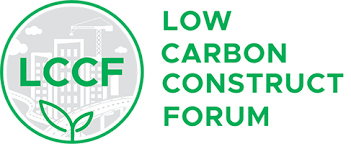The 3rd International Workshop on Technologies for Low-Carbon and Lean Construction (TLC2) which was held at the Indian Institute of Technology, Madras (IIT Madras) from January 28th to 31st, 2024, marked a significant milestone in the knowledge-sharing on sustainable construction practices. The workshop provided a platform for participants from diverse backgrounds, including students, researchers, and industry professionals to probe into the latest advancements, challenges, and opportunities in sustainable construction practices and to explore innovative solutions for advancing low-carbon and lean construction technologies.
Impressions from TLC2 Workshop held at IIT Madras
Report by,
Dr Dhanya B. S., Associate Professor-Civil, RIT, Govt. Engineering College, Kottayam
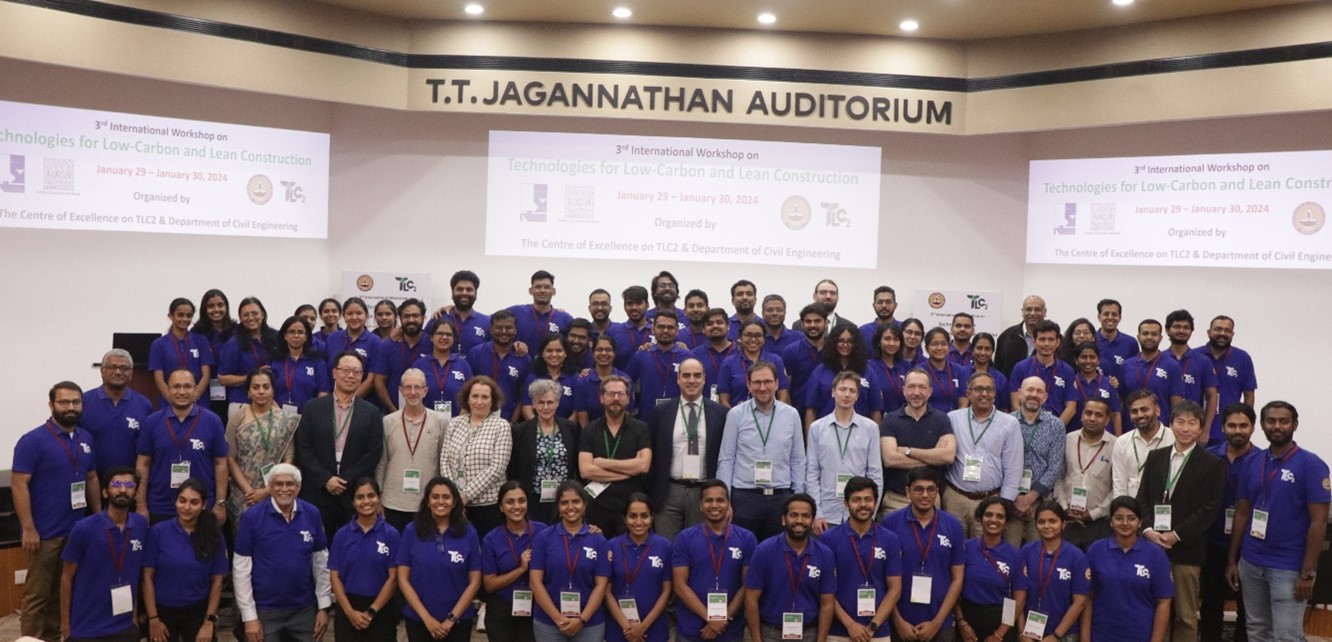
The workshop commenced with the Young Researchers’ Symposium (YRS) on January 28th, providing a forum for young researchers to showcase their research findings and engage in constructive discussions. The presentations provided valuable insights into different facets of sustainable construction such as mechanical characterization of 3-D printable cementitious mortars, assessment of coal combustion products, influence on cement-based composites, the development and validation of sustainable fibre-reinforced concrete pavements, the elucidation of shear capacity in reinforced recycled aggregate concrete, and the macro and microstructural effects of combined exposures on concrete deterioration. The symposium facilitated knowledge dissemination and networking among young researchers belonging to leading institutions from different countries, including the University of Toronto, Canada; University of Leeds, UK; Monash University, Malaysia; Polytechnic University of Milan, Italy; Polytechnic University of Catalunya, Spain, as well as the reputed Indian institutions such as Indian Institute of Science (IISc) Bangalore, IIT Palakkad, and IIT Hyderabad.
Poster presentations by young researchers followed the presentations, enriching the workshop by showcasing innovative research projects and findings across various domains of sustainable construction sessions facilitated interaction between attendees and scholars, nurturing idea exchange and potential collaborations. The symposium recognized outstanding student contributions. by presenting awards Dr Purnima Dogra from Thapar Institute of Engineering and Technology and Mr. Ashutosh Dwivedi, a PhD student from Indian Institute of Science (IISc). The YRS fostered a nurturing environment for knowledge exchange and networking among emerging researchers, setting the stage for the main workshop days ahead.
The TLC2 workshop held on January 29th and 30th explored diverse array of topics through six distinct sessions. The sessions on the first day was led by experts from IIT Madras in their respective fields and it included computational materials modelling headed by Dr. Aslam Kunhi Mohamed, rheology and 3D printing of concrete guided by Dr. Manu Santhanam, and technologies for built environment sustainability led by Dr. Ashwin Mahalingam.
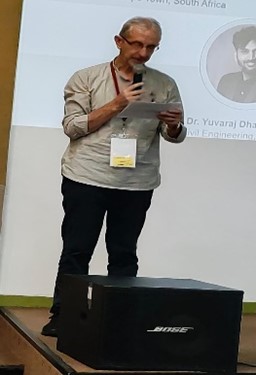
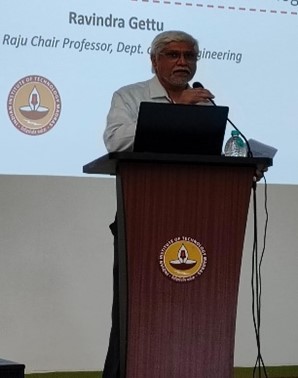
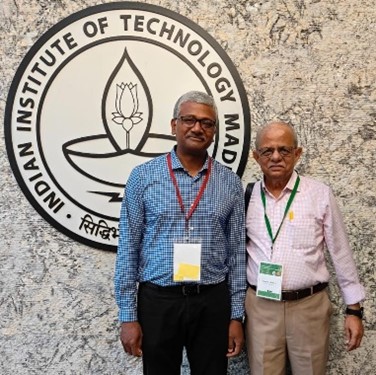
TLC2 Workshop photos: Prof Mark Alexander (left), Prof Ravindra Gettu (centre) and Prof Manu Santhanam and Vijay Kulkarni (right)
The following day of the workshop explored low-carbon construction materials under the guidance of Dr. Karen Scrivener from EPFL, Switzerland, and durability and sustainability, facilitated by Dr. Mark Alexander from the University of Cape Town, South Africa, and the session on life cycle analysis/industrial ecology was discussed under the expertise of Dr. Ravindra Gettu from IIT Madras. These renowned experts led the intensive sessions, sharing their visions and cutting-edge research findings. The discussions served as focal points for lively debates and knowledge sharing, addressing critical topics such as procurement practices supporting sustainable construction, legal perspectives on sustainable cities and built environments, and the role of artificial intelligence in enhancing sustainability in construction projects. These discussions emphasized the interdisciplinary nature of sustainable construction and highlighted the importance of collaboration between academics and industry.
The final day of the workshop had in a panel discussion titled “Making Lean and Sustainable Construction Implementation Possible: A Push or a Pull Approach?”. This discussion explored practical strategies for implementing sustainable construction practices within the Indian scenario, with panelists offering insights from their respective sectors and experiences. Among the distinguished speakers were Dr. K N Satyanarayana from IIT Tirupati, Dr. Senthilkumar V. from IIT Palakkad, Mr. Nirmal Goel from CPWD, Mr. Mouli Durai from L&T Construction, Ms. Nidhi Batra, Dr. Venkata Santhosh Kumar, Dr. Ashish Goel, Dr. Murali Jagannathan, and Dr. Johan Ninan. The speakers explored various facets of sustainable construction, from implementation strategies, technology implementation perspectives, procurement practices, legal considerations, lean construction methodologies, public procurement policies, AI applications, and international perspective on implementing sustainable practices in construction projects. Each speaker contributed a deeper understanding of the challenges and opportunities in the field, providing attendees with understandings to advance sustainable practices in construction.
Overall, the TLC2 workshop at IIT Madras was a resounding success, providing a collaborative platform for stakeholders to explore innovative solutions, share insights, and forge meaningful connections. As the world wrestles with the urgent challenges of climate change and resource depletion, initiatives like TLC2 play a crucial role in catalysing transformational change in the construction sector. Through intensive sessions, lively debates, and knowledge sharing, participants gained a deeper understanding of the complexities and opportunities within the field. The collaborative efforts between academics and industry highlighted the collective commitment towards building a more sustainable future for the construction industry. Overall, the workshop laid a solid foundation for advancing the agenda of sustainable and lean construction practices in the years to come.
Author Profile
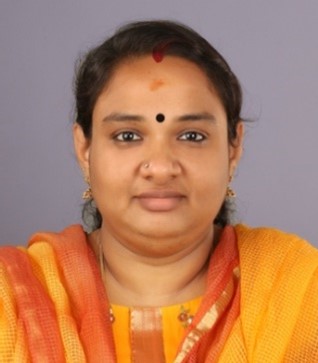
B.S. Dhanya holds a B.Tech and M.Tech degree in Civil Engineering from the University of Kerala; and obtained a Ph.D. degree from Indian Institute of Technology (IIT), Madras. She is presently working as an Associate Professor in Civil Engineering at RIT, Govt. Engineering College, Kottayam, Kerala. Her areas of interest include durability of concrete structures, corrosion of rebar in reinforced concrete, and structural design of reinforced concrete structures. She is the recipient of ICI-UltraTech award for outstanding young concrete engineer – 2018, ICI National award for Best Ph.D. thesis in concrete – 2016 and best paper in poster presentation in ‘CORCON 2016’, organized by National Association of Corrosion Engineers (NACE).

